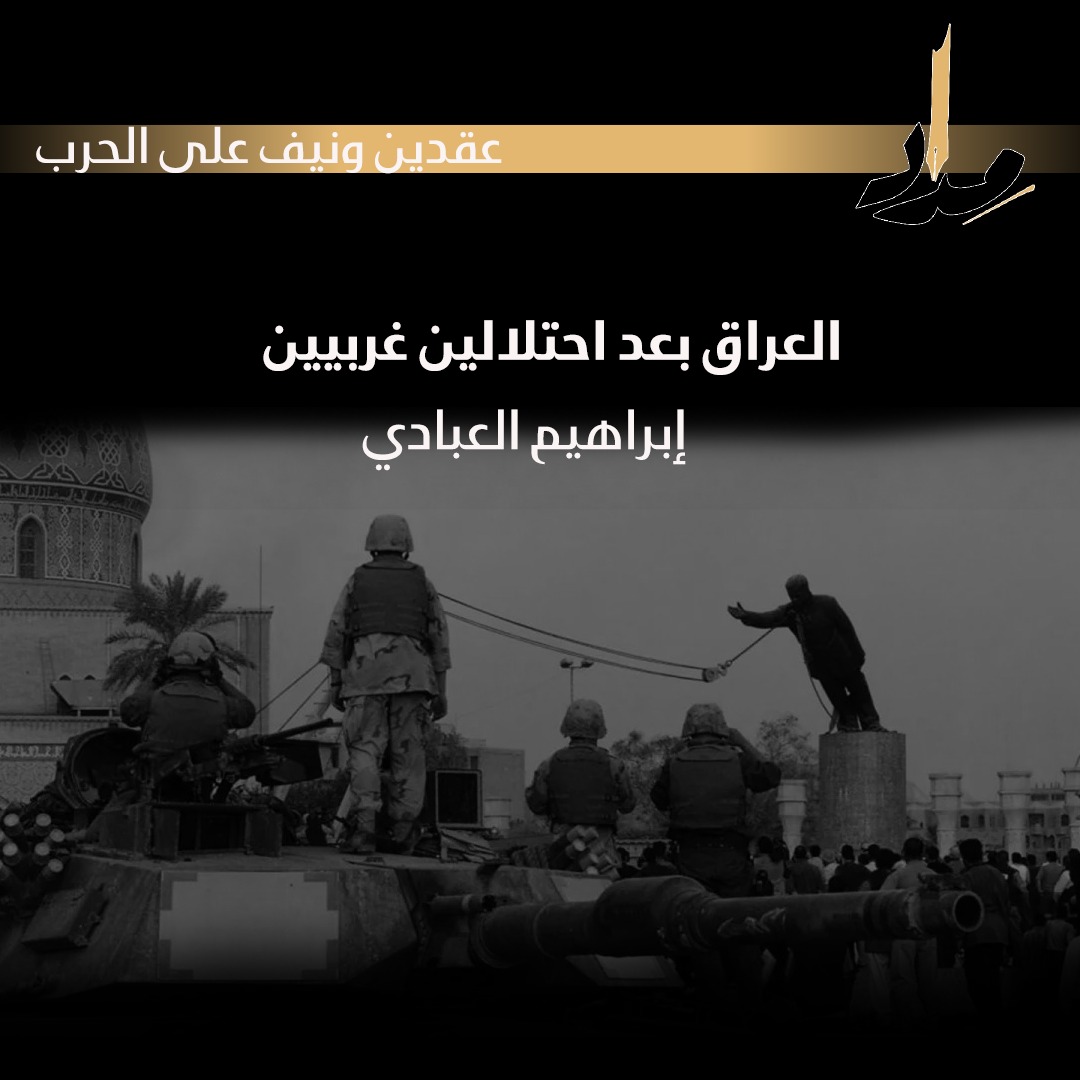 2025 / 12 / Apr
2025 / 12 / Apr
On April 9, 2003, American forces solidified their control over the last Iraqi military sites, marking the end of a despotic regime that had led the country into destruction and chaos. Eighty-three years prior, the British had announced their control over Ottoman Iraq, beginning their long journey in building the modern Iraqi state according to their vision and plans.
The British faced local uprisings and rebellions, leading them to establish a national government under direct supervision, accompanied by political, economic, and security engineering of the Iraqi reality. When the Americans arrived decades later, they repeated the experience of mandate but found themselves facing armed rebellions and multiple resistance movements, amidst additional complexities resulting from the self-destruction led by the one-party system and the ruling family over 35 years, preceded by the experience of military intervention in politics and the dominance of the army over public administration and political life.
The British were serious about developing administrative bureaucracy to ensure political and security stability and enhance economic development, granting them long-term influence, so Iraq would remain part of the empire "on which the sun never sets." In contrast, the Americans sought to make Iraq a field for democracy experiments and confronting extremism and despotism, according to a new strategic vision that aligns with the challenges of the third millennium, after the Manhattan invasion in September 2001 shook the symbols of American economic power at the hands of Al-Qaeda, which was hiding in caves to confront the greatest global power.
In a changing world where multipolar conflicts receded in favor of American dominance after the fall of the Berlin Wall, Iraq faced a historical opportunity to shorten its path towards a stable state and a self-reconciled society. However, as usual, this opportunity was wasted due to collective blindness—American and Iraqi.
Between these two occupations, Iraq continued to struggle between political despotism and internal conflicts among social and political forces, leading to the destruction of decades of development and the shattering of institutions, and the release of pent-up political tensions due to the utter failure in transforming society into an organized entity within a state with clear goals and practical visions. After a century of occupations, political, security, and constitutional arrangements, Iraq has consumed an entire century of lost opportunities and wasted years of comprehensive development that could have moved it to the ranks of stable countries with a solid national identity and ambitions worthy of its history, civilization, and geo-economic position.
How do we interpret the political history of Iraq after a century of oscillation between chaos, corruption, and violence? What practical lessons can be drawn to overcome this confusion and loss? How can mature national awareness be achieved to prevent the repetition of political mistakes and errors, and guide society towards building a state that ensures intellectual and cultural protection for citizens from falling into the trap of uncalculated ideological and political projects, which often lack considerations of real national interest?
I would argue that Iraq's eternal problem lies in its own societal structure. It is a structure divided throughout history between idealistic moral directions and realistic material ones. Iraqi society is a prisoner of its historical memory, unable to think about its present and future without invoking a past heavy with anxiety and suspicion, conflicting interests and goals, divisions of identities, and conflicts between the strong and the weak.
Iraqi Political Awareness and Its Crises
This problematic is not exclusive to Iraq, but what distinguishes Iraqi society today is its varied awareness of the causes of internal and external concern and rivalry. It is a society immersed in ideologies of past eras, treating its problems according to a narcissistic self-view centered on the inflation of societal self and exaggerated feelings of pride, which are countered by deep feelings of impotence and betrayal.
Alongside these feelings, Iraqis live as educated but helpless individuals, believing their problems stem from external conspiracies and ongoing hostilities, yet finding themselves unable to overcome their internal obstacles, including the inability to confront those who lie in wait and covet. This is clearly reflected in political action, which suffers from corruption and sectarian allocation, preventing the achievement of general goals for every citizen.
The failure of contemporary Iraq in establishing a stable state, in my view, is due to the weakness of political experience, which is linked to the weakness of political actors, whether individuals or groups. This weakness is primarily a result of the decline of political awareness and its subjugation to assumptions and constants that do not prioritize the protection of community security, economy, and intellect.
Iraqi political forces have remained captive to local, regional, sectarian, and nationalist views, making them a fertile ground for external projects. Just as socialist and nationalist thought undermined the monarchical system that lasted 37 years before turning into a wasted experience, contemporary Iraq has squandered the opportunity to rebuild itself when political bidding, religious extremism, and historical anxieties replaced rational visions that reject wasting opportunities for the sake of fanciful ideas and indulged fears.
In the absence of community criticism and focusing criticism on daily political appearances, a rare opportunity for rebuilding Iraq and overcoming past failures was aborted. Instead of leading the process of correction, society followed a political class that shares positions and wealth, plagued by corruption, waste, and inefficiency.
Contrary to the hypothesis that Iraqis live in a modern state with a political system that absorbs experiences and effective governance, they find themselves stuck between dismal political choices: either traditional forces bound by sectarian orthodoxy or unproductive utopianism, or emerging forces lacking political maturity and modern party organization.
Iraq today, as in the past, lives on two pillars whose essence has not changed: a rentier state and a garrison society, as described by the late sociologist Karim Muhammad Hamza. If Iraq does not exit this calcified path, it will never transcend the stage of a fragile state and its chronic anxiety.

Ibrahim Al-AbadiIbrahim Al-AbadiIbrahim Al-AbadiIbrahim Al-AbadiIbrahim Al-AbadiIbrahim Al-Abadi